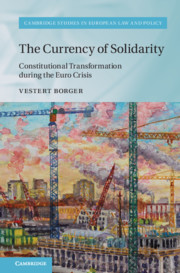Book contents
- The Currency of Solidarity
- Cambridge Studies in European Law and Policy
- The Currency of Solidarity
- Copyright page
- Dedication
- Contents
- Series Editors’ Preface
- Preface
- Acknowledgements
- Previously Published Work
- Table of Cases
- Prologue
- Part I Solidarity between the Member States
- Part II The Original Stability Conception
- 3 Committing to Stability
- 4 Law and Economic Wisdom
- Part III The New Stability Conception
- Conclusion
- Bibliography
- Index
4 - Law and Economic Wisdom
from Part II - The Original Stability Conception
Published online by Cambridge University Press: 24 September 2020
- The Currency of Solidarity
- Cambridge Studies in European Law and Policy
- The Currency of Solidarity
- Copyright page
- Dedication
- Contents
- Series Editors’ Preface
- Preface
- Acknowledgements
- Previously Published Work
- Table of Cases
- Prologue
- Part I Solidarity between the Member States
- Part II The Original Stability Conception
- 3 Committing to Stability
- 4 Law and Economic Wisdom
- Part III The New Stability Conception
- Conclusion
- Bibliography
- Index
Summary
This chapter examines four flaws in the most essential assumptions underlying the single currency’s original stability set-up that were exposed by the crisis. The first concerns market discipline. The chapter looks at some of the key explanations for the failure of market discipline, in particular, those professed by the ECB. The second flaw concerns the instrument of public discipline. The shortcomings of this instrument were already visible in the early 2000s when France and Germany violated the Stability and Growth Pact. The chapter analyses these violations, the court case to which they gave rise and the reform of the Stability and Growth Pact that followed it in 2005. The third flaw concerns the excessive attention for budgetary discipline. In its preoccupation with ensuring fiscal prudence, the original set-up was blind to risks stemming from other corners of the economy, especially the banking sector. The fourth flaw is the cardinal one. Geared to safeguarding price stability, the single currency’s legal set-up left another stability dangerously exposed: financial stability. The chapter discusses its importance and the need to have it protected by a ‘lender of last resort’.
Keywords
- Type
- Chapter
- Information
- The Currency of SolidarityConstitutional Transformation during the Euro Crisis, pp. 154 - 202Publisher: Cambridge University PressPrint publication year: 2020

